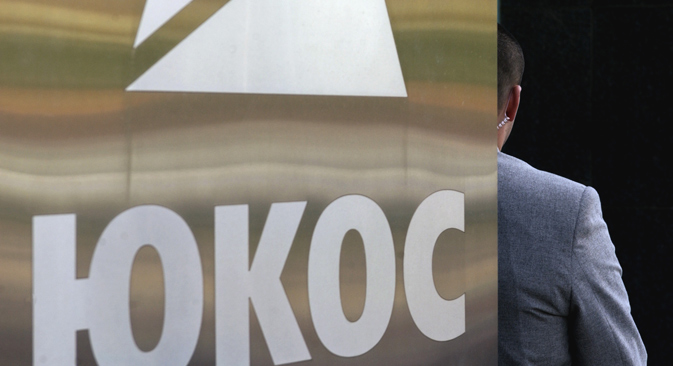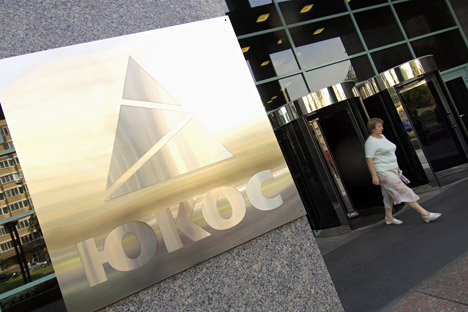Moscow reacts angrily as Belgium seizes Russian state assets in Yukos case

At the Yukos main office, Moscow, 2004. Source: Grirogy Sysoev / TASS
The Kremlin has reacted angrily to the sudden seizure of Russian state assets in Belgium by authorities in Brussels in connection with Russia’s refusal to follow the order of an international arbitration court to pay $50 billion in civil damages to shareholders of the now-defunct oil company Yukos.
On June 18 the Russian Foreign Ministry reported that bank accounts in Belgium belonging to the Russian Embassy and the Russian Permanent Representation to the EU and NATO, as well as a series of other organizations, had been frozen in response to an order from a Belgian court to seize 1.65 billion euros’ worth of Russian state assets.
In response the ministry called the Belgian ambassador and informed him that Moscow views Belgium's actions as an "openly hostile act" and a "gross violation of universally recognized norms of international law." The ministry threatened to undertake "adequate retaliatory measures" with Belgian property in Russia if Belgium does not restore "Russia's violated sovereign rights."
On the evening of June 17 it was announced that 47 Russian and international organizations registered in Belgium had received a bailiff's order requiring them to present information on all properties and resources that belong to the Russian government within 15 days.
The following day, representatives of the VTB bank announced that the French authorities had seized the bank accounts of Russian companies and diplomatic representatives in the bank's French subsidiary. The accounts of the diplomatic mission were later unfrozen.
An order of arrest was also issued for properties belonging to Russian state mass media: news agency TASS, the Rossiya Segodnya International Information Agency and the All-Russia State Television and Radio Broadcasting Company.
The Hague decision
The seizure of Russian property in Belgium is being carried out by order of a Belgian court in relation to the lawsuit involving Yukos Universal Limited, a subsidiary of GML (the Group Menatep Limited, which is managed by one of the oil company’s former directors, Leonid Nevzlin). Yukos, which became one of Russia’s most successful companies during the 1990s, was controversially taken over and broken up following the arrest of CEO Mikhail Khodorkovsky in 2003 on charges of tax evasion widely seen as a pretext for the state’s acquisition of the firm’s assets.
The Belgian court based its decision on a ruling pronounced by Permanent Court of Arbitration in The Hague on July 18, 2014. According to the RIA Novosti news agency, the document issued by the Belgian bailiffs says that Yukos Universal Limited had asked them through a Belgian lawyer to implement the decision of the court, which had obliged the Russian Federation to pay the company an amount of more than 1.6 billion euros in civil damages.
The court also established that Russia must pay $39.9 billion to another GML subsidiary registered in Cyprus, Hulley Enterprises Limited. RIA Novosti reported that the accounts of Russian companies in France had been frozen in relation to the damages claimed by Hulley Enterprises in its lawsuit. Andrei Kostin, president of VTBBank,told the RBK newspaper that the frozen "sums were insubstantial, amounting to just tens of thousands of euros."
Besides the companies mentioned, in July 2014 The Hague court also ordered Russia to pay $8.2 billion to another company, Veteran Petroleum Ltd, the Yukos pension fund. For now the company has not been mentioned, according to the mass media. The Russian government has said the decision made in The Hague was politicized and has already launched an appeal.
On the evening of June 17 the Interfax news agency reported that almost all the large Russian banks, Russian representatives, non-governmental organizations and mass media had received the Belgian bailiff's order. The institutions also include the Brussels and Belgian Eparchy of the Russian Orthodox Church.
Russian Minister of Economic Development Alexei Ulyukayev has called the seizure of Russian property illegal, declaring that Moscow will challenge it in court. He also said that Russia refuses to make any payments related to the Yukos affair. In his words, the value of the frozen property is insignificant, but "the fact in itself is obviously very unpleasant."
A ‘sad story’
Lawyers are divided in their opinions on the arrest of Russian property abroad as a means of obtaining the sum of the damages awarded. Artur Zurabyan, director of international litigation and arbitration at the Art De Lux legal firm, said that "there really are no prospects."
According to Zurabyan, Russian state property related to the realization of Russia's public-legal functions, such as representation offices, consulates, etc., cannot be seized because it has diplomatic immunity. Therefore, the Belgian and French governments (or others, if the list is enlarged) are faced with the challenge of finding state property that is not related to those functions, which Zurabyan describes as rather difficult.
Alexander Arutyunov, head of Moscow's Arutyunov and Partners Legal Association, is of a different opinion. He says that the seizure is a “sad story” and that it is possible that Russia will have to pay the claims. He drew a comparison with the case of the Swiss company Noga, which made numerous attempts to seize Russian state property abroad following the Russian government’s annulment of a contract with the company in 1993.
Representatives of the Swiss company, which had earlier signed a deal for the supply of food and industrial products, claimed that the losses caused by Russia's action amounted to $1.5 billion. Noga tried to arrest Russian property abroad several times, but in this case the seizures were recognized as illegal.
A signal from the EU?
However, some Russian observers are of the opinion that the arrests are not as important in themselves as they are as a political signal from the EU to Moscow. Zurabyan believes that the bailiff's requests to the Russian mass media, non-profit organizations and the Russian Orthodox Church, "which has no juridical relation to Russia,” imply that this is still “a political and not a legal move.” This way the EU is telling Russia that it must think about carrying out the Hague court decision, as well as the decision pronounced by the European Court of Human Rights, said Zurabyan.
Last year, around the same time The Hague court made its decision, the European Court of Human Rights (ECtHR) in Strasbourg decided that Yukos shareholders were entitled to 1.9 billion euros in compensation. Just as with the Hague verdict, Moscow also disagreed with the one pronounced by the ECtHR.
When on June 17 Russia received information about the property seizures in Belgium, the mass media, citing the Belgian bailiff orders, reported that they had also mentioned Russia's failure to follow the Strasbourg decision. However, on June 18 the ECtHR explained that there is no relation between the events in Belgium and Russia's position on the Strasbourg decision.
Andrei Bushuyev, one of the seven ECtHR judges that sat on the Yukos trial, told RBTH that he could not understand why the Belgian bailiffs had referred to the ECtHR. He also underlined that, "now it is clear that the decisions of the international courts on the YUKOS affair are extremely contradictory, and on many issues of the litigation even mutually exclusive."
All rights reserved by Rossiyskaya Gazeta.
Subscribe
to our newsletter!
Get the week's best stories straight to your inbox
